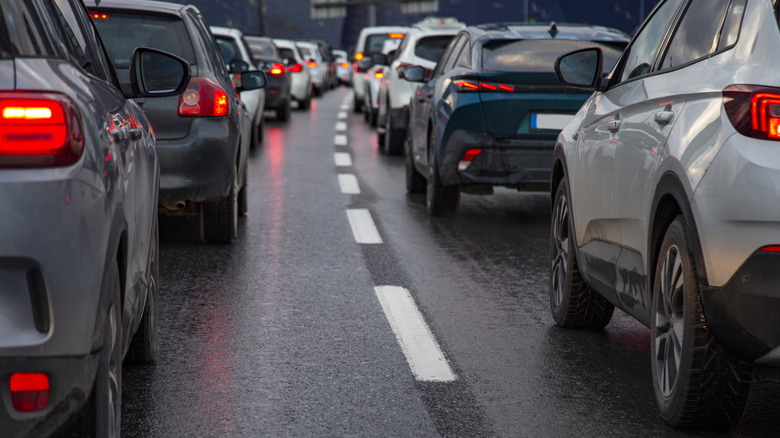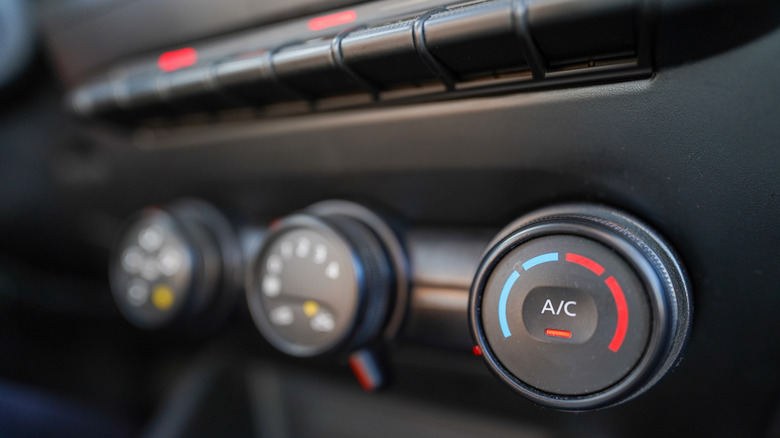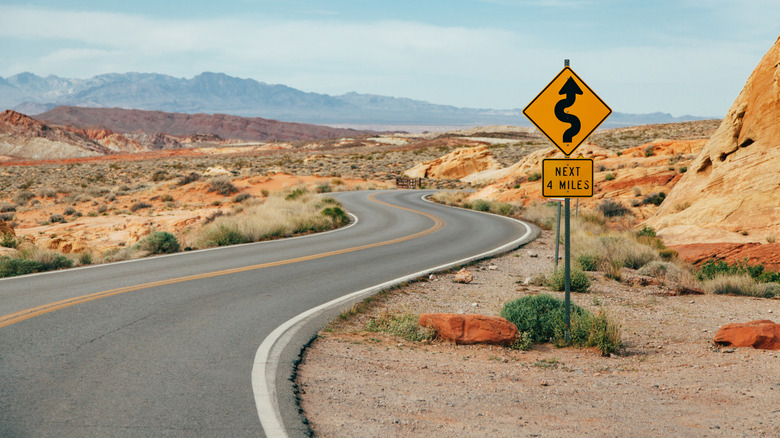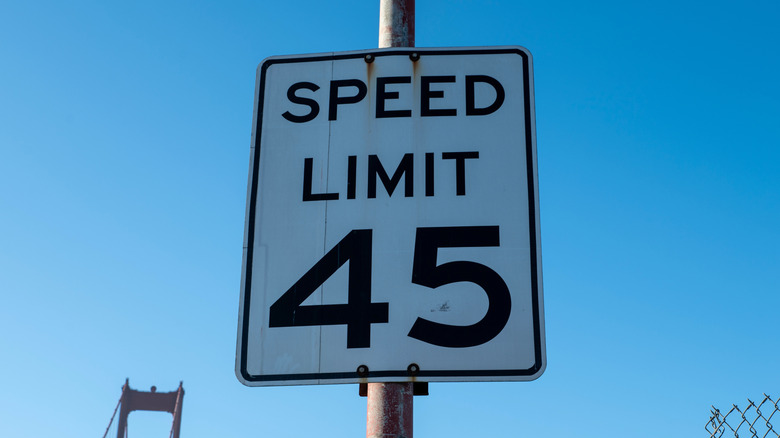5 Tips To Improve Gas Mileage In An Older Car
Saving money on gas is a priority for most drivers, whether your car is brand-new or a beater with hundreds of thousands of miles on its odometer. When it comes to the latter, however, achieving desirable gas mileage can be tough. There are many reasons why your mpg can drop, from your vehicle's systems to your driving habits. Yet some myths about fuel can cause you to waste time and money, especially with older vehicles. Fortunately, smart driving techniques can help you save on fuel and make your older car more efficient.
While regular maintenance like oil changes is ideal for maximizing your car's performance, there's more to saving money on gas than checking tire pressure and topping off fluids. You may also be out of luck if your vehicle has features like AWD, for example, because the add-on does affect fuel economy. Still, if you drive an older car, it's worth considering these tips to improve your gas mileage.
Skip using the A/C
Though vehicle heaters are highly efficient — using the engine's heat to warm you up on cold days — we can't say the same for A/C systems. You may already know that switching on the air conditioning makes your vehicle work harder, but A/C use can significantly impact fuel efficiency. In an older car, every mile per gallon matters, and you might achieve better numbers by skipping the A/C. Consumer Reports found that running the A/C on even a mildly warm day could decrease fuel efficiency by anywhere from 1 to 4 mpg. The exact fuel savings vary based on the car, so results may differ.
Other sources back up Consumer Reports' findings. For example, the U.S. Department of Energy notes that in very hot weather, using A/C can cause your mpg to drop by over 25%. Plus, the Society of Automotive Engineers (SAE) determined that between 40 and 70 mph, two vehicles they tested used more energy with the A/C on than with the windows down. That's not to say driving with your windows down is always a great way to boost mileage, though.
Drive with the windows up
After driving two different cars (an older model Toyota Camry and a 1972 Volkswagen Super Beetle) without A/C for too many years, I completely understand the need to have your windows down at just about every speed in the summer. However, if you're traveling on higher-speed roadways in more tolerable weather, keeping the windows up could be beneficial for the bottom line when it comes to mpg.
This tip for improving fuel economy in older cars comes down to aerodynamics. Basically, cars in motion are subject to air resistance. The faster you go, the more drag there is. Drag is a force that acts against your car, and more drag means the car works harder (and uses more fuel) to move (with lift being another aspect of aerodynamics, but not as important in this discussion of forward motion and the fuel used to propel your car).
Since reducing drag can improve fuel economy, some sources suggest that driving with your windows up helps cut down on drag when you're driving at higher speeds. For example, the SAE found that at speeds of 75 mph, a Toyota Corolla's windows-down fuel economy was comparable to that of having the A/C on. Results may vary, however; Consumer Reports found little difference in fuel economy between windows down and A/C use at 65 mph.
Stop idling in traffic
Many myths abound over whether it's better to idle in traffic or shut off the engine instead. It turns out there's some truth to the myth that you shouldn't idle in traffic, because it does, in fact, waste gas. Scientists suggest that even a stop as brief as 10 seconds can cost you more in gas if you leave the car running, versus shutting it off for a short time.
An exception is if you drive a vintage car; that old of a vehicle won't benefit from frequent shutoffs in traffic jams. Another exception applies if your vehicle is new enough to have a stop-start system. Stop-start systems in newer vehicles make this particular tip a gas-saving myth. You may need to read your car's driver manual to determine whether it has a stop-start system.
In a similar vein, you might wonder whether coasting or engine braking helps with fuel economy. The answer, again, depends on how old your vehicle is. But the truth is that engine braking can help you achieve improved fuel economy, though the difference will likely be minimal. Given that everything adds up, however, it's still worth testing.
Take the scenic route
Since stop-and-go driving can waste gas, according to the U.S. Department of Energy, it makes sense to choose your route carefully. Depending on where you live and work, you may want to take the scenic route versus the stoplight-filled or traffic-congested path. The natural consequence of avoiding stop-and-go traffic is that you'll generally achieve improved gas mileage. There's a reason that vehicles get better fuel economy on highways, and it might be because the more you idle, the lower your mpg, says the Department of Energy.
An easy way to see this difference is by comparing your vehicle's estimated miles per gallon for highway versus city driving. For example, my 2004 Toyota Sienna is rated for 17 mpg city and 25 mpg on highways. One exception to this rule is hybrid and EV vehicles with regenerative braking; my 2013 Toyota Prius has a 43 mpg city rating and 39 mpg highway rating, due to the regenerative power of braking.
There is a caveat to taking the scenic route, however. The U.S. Department of Energy points out that hilly terrain has a negative impact on gas mileage. So, when we say scenic routes, we mean straight ones along highways, freeways, and rural routes that aren't winding.
Follow posted speed limits
Quick "fixes" like fuel saver chips have no basis in automotive science, but that doesn't mean you can't make changes to save gas. While having a fuel-saving chip might impact your driving behaviors, which habit can you change without spending money on a device? One such change is a very responsible move that can reduce your risk of getting into an accident and save you money on gas: Drive slower.
According to the U.S. Department of Energy, keeping speeds to 50 mph or under is ideal for maintaining fuel economy. In fact, research suggests that for every 5 mph over 50 mph that you go, you'll be paying 27 cents more per gallon of gas due to that lost efficiency. You could save the equivalent of as much as 54 cents per gallon on gas by driving 5 to 10 miles per hour slower during your daily driving. In places with higher speed limits, this may be a frustrating change of habit, but considering how much money you could save, it just might be worth it.





